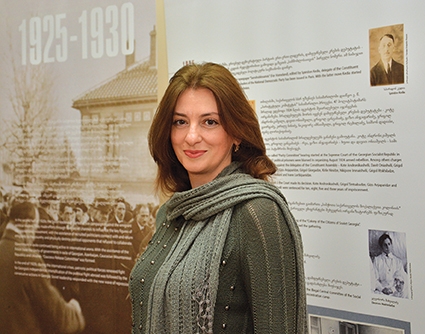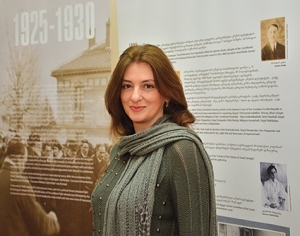Breathing New Life into the Tbilisi Main Library
Apart from serving its classic purpose, a library should be a place where new ideas are formed, where educational and cognitive projects are planned. Thematic events, book presentations, literature evenings and numerous other things should be held there- anything that will widen the circle of readers. However, most of the libraries here are still of the soviet-type: small reading halls, scarce book funds and obsolete service.
The 107-year-old Tbilisi Main Library is facing that challenge – together with its 32 libraries spread throughout various neighborhoods in the city, it is struggling to meet the needs of modern readers, not helped by a lack of state funding. Nevertheless, Tbilisi Main Library does have the ambition to turn itself into an exemplary space which will be actively involved in the cultural and educational life of the city. The acting General Director of the library, Lena Askurava, says that the first steps to this aim were taken in March.
You have a lot of elderly readers, which is good, but how do you plan on attracting the young?
Lena Askurava: We plan to offer additional services to the younger generation. We want to implement an electronic management system in the library, which includes purchasing an integrated library program. The users will be able to register online, use e-catalogues, learn about our book depot and even reserve the book they want online. The library will analyze the most in-demand books and conduct various internal studies.
The library was always in line with the educational policy, but has gradually lost this function...
Events are held in the library to this day, though of a small-scale. This is due to the lack of information. We plan on working with society in this regard.
It is vital to arrange a working space where various meetings can be held. To help build social networks we want to set up comfortable book cafes- places for exchanging ideas and meeting friends. From March, we plan on carrying out various activities each weekend, which started on February 24th with World Book Day during which we organized meetings with contemporary writers.
We aim to set up a Board of library supporters comprised of people who will be oriented towards its development, who will help us find foundations for funding and help to form relations with the International Library Association. We are putting our hope in our energetic youth who can contribute to the revival of libraries in their own neighborhood.
We’ll restore the Movie Club, which was suspended due to renovation works and we’ll also cooperate with publishers and provide booths and spaces for presentations. We also want to organize Georgian language classes for foreigners.
Do you plan anything for school students?
At the moment we’re negotiating with hospitals as we want to take books to children that have leukemia and hold book-reading days there. A social project - Mobile Library – will be supported by volunteers. We’ll offer the same service to adults in the Dialysis Center. At present, we have an employee who’s been taking books to a young girl in Varketili district who has a disability, and also to pensioners, for years. We want to transform this wonderful act into one of our services.
We also want to introduce a family package, where a mother can bring her child to the library for a couple of hours and be able to work or study in the library while her child is kept entertained.
What’s more, we plan to arrange a Saturday School for children, with socially vulnerable families exempt from fees.
At the moment of its foundation the library fund stored 3438 items. What is the situation a century later?
The book depot now holds around one million editions. Last year we made one of the biggest purchases, buying bestsellers from almost all publishing houses. We’ve had a Special Fund since the Zubalashvili period. These unique books are scattered throughout our libraries. We want to create a separate fund- at first we’ll ask experts to evaluate them and later will digitalize the books so that they become accessible for our customers in the form of e-books. IT will be a new process of discovery.
Do you plan to rethink the personnel policy when switching to the electronic system?
We will train our staff. I’m sure that, in spite of their age, they’ll be able to master the new system. Parallel to the development of infrastructure, the image of a librarian will change too. We need to become members of the International Library Association, to share the experience with our employees, to arrange online conferences. This form of communication will help us structure a modern model for the library.
What is the biggest challenge you face?
The development of infrastructure, which requires huge funding, as the existing budget is insufficient. This is why we want to make an exemplary model of ‘library’ in the Tbilisi Main Library. And as for the branches, we might keep the vintage style in some of them: with catalogue boxes, table lamps, large shelves, wooden tables... It would be great if the private sector would engage in the process. Libraries in the neighborhood need to develop. Our social advertisement will be aired on the Public Broadcast soon and we’ll be cooperating with other media channels as well.
Irma Kakhurashvili











